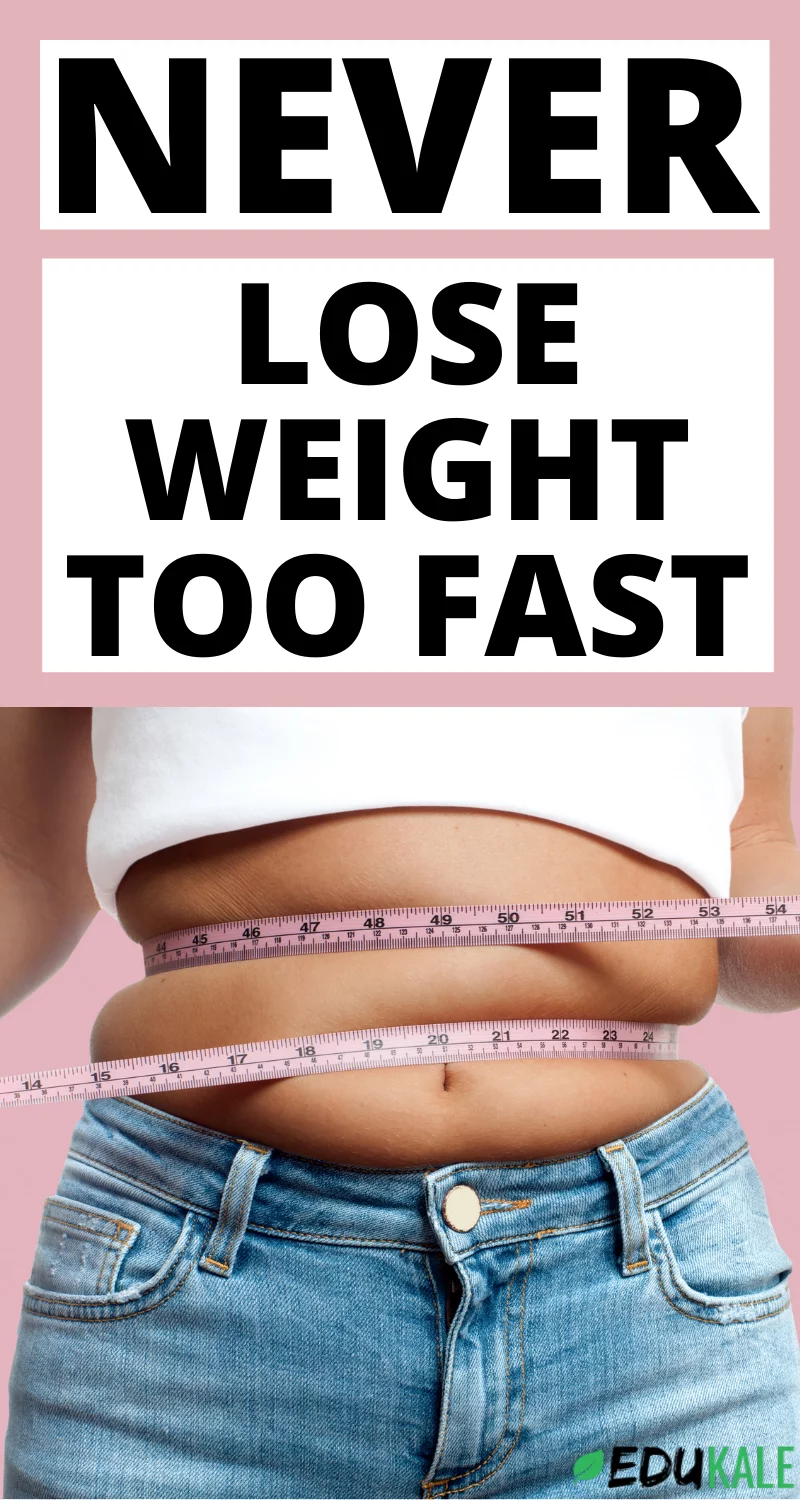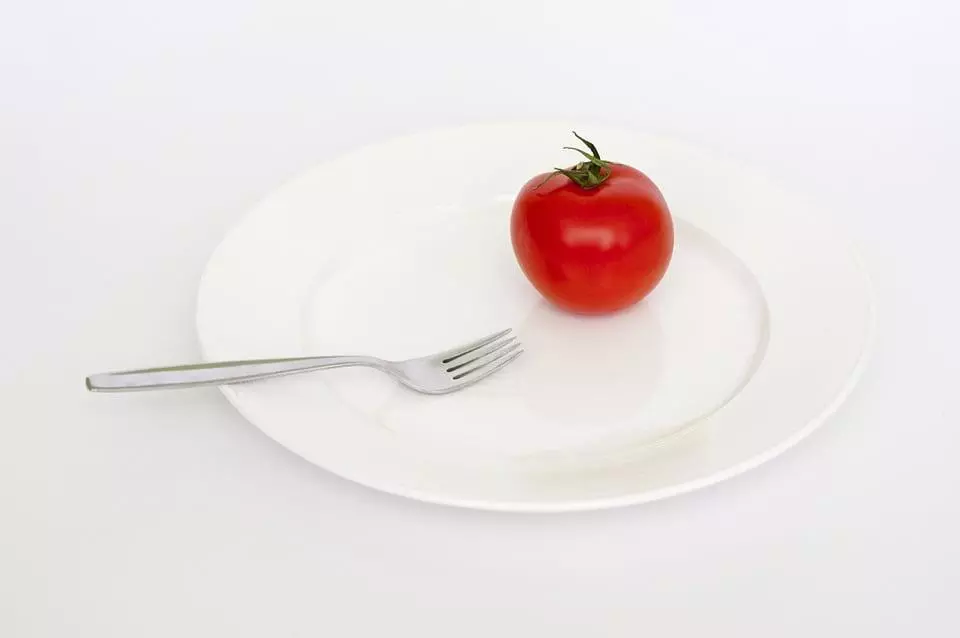This post contains affiliate links from which I may receive a small commission, at no extra cost to you. In no way does this affect my opinion or the information I provide on the product. Please read my disclaimer for more info.
Get bikini ready in two weeks!
Fit into your wedding dress in a month!
Drop 20 pounds in a week!
There are so many enticing headlines that promise unrealistic and unhealthy goals.
But you really shouldn’t try to lose weight too fast. It can be dangerous and you will never keep the weight off.
Want to know why, and what to do instead? Then read on!

1. You won’t keep the weight off
In order for these super-fast weight-loss plans to work, they require drastically reducing your intake in calories, which simply can’t be done in a healthy, sustainable manner.
Even if you are able to lose weight, it will be mostly water weight. Sure enough, drastically reducing your calorie intake often means reducing your carb intake.
When you don’t consume enough carbohydrates, your body is going to use your glycogen sources for energy. These are long glucose chains that also hold molecules of water. When you start burning them off, you will lose a lot of water, which will result in weight-loss. [1]
Read about why carbs are good for you here!
Water weight isn’t all you’re going to lose if you keep at it for a while of course, but it doesn’t matter because none of it will last long anyway.
Following a calorie-restrictive diet will slow down your metabolism. This is a normal process: since you’re going to be losing weight, you’re going to be requiring less energy to keep it functioning properly. This will cause you to burn less calories at your resting state.
However, a study [2] showed that after losing weight, peoples’ metabolisms slowed down more than what would have been expected for their new body size.
According to some people, losing weight too fast also leads your body into something called “starvation mode”, causing your body to desperately hang on to the weight you are trying to lose because it thinks that you are starving.

While I wouldn’t necessarily use this term, it is true that if your body is used to functioning with a certain number of calories a day and you drastically cut that number down, it’s going to save energy by slowing down.
Sadly, it’s much quicker to slow down your metabolism than to speed it back up. Indeed, a study [3] showed that people who had lost weight drastically still had their super slowed-downed metabolisms 15 years later!
Another thing to take into account is your leptin levels. Leptin is the “satiety hormone” that tells you to stop eating when you are full. It decreases when you lose weight, meaning that you will eat less and feel even hungrier— now that’s not easily sustainable.
Maintaining weight-loss requires eating fewer calories than for the initial weight-loss. This is only sustainable if the weight is lost over a long period of time, enabling your body and hunger cues to adjust over time.
This is what you should be aiming for— you’ll find more information on that later.
2. You’ll have negative side effects
Drastic weight-loss is in no way beneficial to your health. Aside from gaining the weight back and damaging your metabolism in the process (as described above), you’ll also be facing some health risks.
First of all, by decreasing your calorie intake, you’ll most likely decrease your nutrient intake as well. You’ll be lacking important vitamins and minerals, and most likely healthy carbs and fats. [4]
Nutritional deficiencies can lead to a variety of health problems, that you can read about here. This also means you could feel very tired, which can lead to poor food decisions and skipping exercise.

Dehydration is also one of the dangers of losing weight too fast. There is a ton of water in food that you won’t be getting when you drastically reduce your calorie intake. Add that to the loss of water weight and you’re at risk for dehydration.
This could lead to unpleasant things like constipation, headaches, muscle cramps…
Another common side effect of extreme calorie restriction is muscle loss. This study [5] shows that people on fast weight-loss diets and people on slow weight-loss diets lose about the same amount of weight.
However, those following fast weight-loss diets lose more muscle than those on slow weight-loss diets. Sure, losing muscle will make the numbers on the scale go down, but it’s probably not what you are looking for.
What you want to do is lose fat while building muscle, which can only be achieved by progressive weight-loss and regular exercising. It’s also important to eat enough protein to maintain that muscle mass as much as possible.
Finally, losing weight too fast may cause you to develop gallstones, little stones in your gallbladder that can cause blockage, inflammation, and a lot of pain. Your gallbladder makes bile, which is important for good digestion.
If you lose weight very quickly, your gallbladder might not be able to empty properly. Furthermore, fast weight loss causes your liver to release a lot of cholesterol into the bile, which is a risk factor for gallstones [6].

3. You’re not considering what’s more important
And that is getting healthier and gaining nutrition knowledge in the long run.
This is perhaps the most important point. If you want to lose weight just because you want to “look better”, stop. Read this article to understand why you don’t really need to lose weight.
If your goal is to just to drop a few dress sizes as quickly as possible, not caring about the effect it could have on your health, you need to take a step back and realize that the only reason why your weight matters is because of its potential link to your health.
If you’re eating healthy foods and not enjoying them, or pushing yourself to exercise and hating it, it’s all going to come crashing down pretty quickly. You have to change your perspective and get in the mindset of someone who truly wants to become healthier in the long run.
Here’s my article on how to get into the right health and weight loss mindset for all of this to work. This has to become an entire lifestyle change in order to be successful.
What you should do for long-term weight-loss
The recommended [7] safe weight-loss rate is around 1 to 2 pounds a week, which is great to aim for.
In order to succeed, the best thing you can do for your body is to learn the basics of nutrition, make home-cooked meals with healthy and nutritious ingredients, eat mindfully, and care for your body without punishing it with any drastic calorie reduction.
A good starting point for this is my healthy eating for beginners article! It covers all the basics on nutrition, healthy eating, and building a great relationship with food.
It takes a while to “unlearn” all your bad nutrition habits and to pick up new healthier ones, but it is so worth it in the long run.
The most important thing you can do for your body today is to teach yourself about these things and implement them little by little. True weight-loss takes time, and it needs to in order to be sustainable.
This avoids activating the “starvation mode”, prevents drastic metabolism drops, and enables your body and appetite to get used to a slight calorie deficit progressively.
In addition, this isn’t fun to hear, but some days are going to be harder than others: you’re going to eat unhealthy things in great quantities, and you’re going to feel like giving up. This is when the “be healthy” mindset is really important.
Sure enough, if you’re doing this as a lifestyle change to become healthier, you’ll realize that health can also mean enjoying a big plate of food at a restaurant, a glass of wine with your meal, or holiday cookies with your family once in a while. It’s about balance, and doing this won’t set you back.
Just be aware of it, know that’s it’s normal, and continue eating healthy, balanced meals the rest of the time.

Take action!
What I recommended now is taking action right away (see this article as a sign to finally do something!) you don’t need to wait for Monday, for next month, or next year. Download my free optimal wellness and nutrition checklist now, and get on the path to a healthy lifestyle— only then can you attain your desired weight.
Another great thing you can do is read a book about healthy eating. There are tons of great options and one I really like is Dr. Greger’s How Not to Die book. There’s more information about it at the end of this blog post if you’re interested!
If you actually spend money on a book, you will be more likely to invest some time and effort into reading it and putting it into practice, rather than just reading this article and moving on with your day for example!
In conclusion, you really shouldn’t lose weight too fast.
You won’t keep it off, and you’ll get side effects such as nutritional deficiencies, muscle loss, and gallstones. What you should do instead is aim for a slow and steady weight loss, focusing on creating a healthier, sustainable lifestyle.
Chose nutritious, whole-foods, eat mindfully, care for your body, and change your perspective regarding weight-loss. It might take a little more time, but it will certainly last.
What’s your experience with weight-loss?
More references
How dieting makes some fatter
Reducing calorie intake doesn’t reduce body weight
Clinical guidelines for weight-loss
-Lucie


Comments are closed.